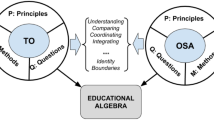Abstract
This paper describes and presents the findings of a study which aimed to trace the development of pupils' use and understanding of algebraic ideas within a Logo programming context relating this to their use and understanding of similar ideas within a non-computational context. The research consisted predominantly of a three year longitudinal case study of four pairs of pupils (aged 11–14) programming in Logo during their normal school mathematics lessons. The data included video recordings of all the case study pulils' Logo sessions, and individually presented Logo and algebra structured interviews. The overall conclusion of this research is that Logo experience does enhance pupils' understanding of algebraic ideas, but the links which pupils make between Logo and algebra depend very much on the nature and extent of their Logo experience.
Similar content being viewed by others
Bibliography
Booth, L. R.: 1984, Algebra: Children's Strategies and Errors, NFER-Nelson.
Collis, K. F.: 1974, ‘Cognitive development and mathematics learning’, paper prepared for Psychology of Mathematics Education Workshop, Centre for Science Education, Chelsea College, London, 28 June.
Douady, R.: 1985, ‘The interplay between the different settings, tool-object dialectic in the extension of mathematical ability’, Proceedings of the 9th International Conference for the Psychology of Mathematics Education, State University of Utrecht, The Netherlands, Vol. II.
Filloy, E. Y. and Rojano, T.: 1984, ‘From an arithmetical to an algebraic thought’ (a clinical study with 12–13 year olds), Proceedings of the 6th PME-NA, Madison, Wisconsin, pp. 51–56.
HarperE.: 1987, ‘Ghosts of diophantus’, Educational Studies in Mathematics 18, 75–90.
Hillel, J. and Samurçay, R.: 1985, ‘The definition and use of general procedures by 9 year olds’, Proceedings of the Logo and Mathematics Education Conference, University of London Institute of Education.
HoylesC. and NossR.: 1987, ‘Children working in a structured Logo environment: From doing to understanding’, Rechersches en Didactique de Mathematiques 8, 131–174.
Hoyles, C. and Sutherland, R.: 1989, Logo Mathematics in the Classroom, Routledge:
KüchemannD. E.: 1981, ‘Algebra’ in HartK. (ed.), Children's Understanding of Mathematics: 11–16, Murray, London.
Noss, R.: 1986, ‘Constructing a conceptual framework for elementary algebra through Logo programming, Educational Studies in Mathematics 17, 4.
PettitoA.: 1979, ‘The role of formal and non-formal thinking in doing algebra’, Journal of Childrens Mathematical Behaviour 2(2), 69–82.
Sutherland, R.: 1988a, A Longitudinal Study of the Development of Pupils Algebraic Thinking in a Logo Environment, Unpublished Doctoral Thesis, University of London Institute of Education.
Sutherland, R.: 1988b, ‘Negotiating a general method in Logo: The role of language, paper presented at Fourth International Conference on Mathematics Education, Hungary.
Thomas, T. and Tall, D.: 1986, ‘The value of the computer in learning algebra concepts’, Proceedings of the Tenth International Conference for the Learning of Mathematics, London.
Thomas, T. and Tall, D.: 1988, Longer-Term Conceptual Benefits from Using a Computer in Algebra Teaching, Mathematics Research Centre, University of Warwick.
Vergnaud, G. and Corte, A.: 1986, ‘Introducing algebra to “low-level” 8th and 9th graders’, Proceedings of the Tenth International Conference for the Psychology of Mathematics Education, University of London Institute of Education.
WagnerS.: 1981, ‘Conservation of equation and function under transformations of variable’, Journal for Research in Mathematics Education 12(2), 107–118.
Author information
Authors and Affiliations
Rights and permissions
About this article
Cite this article
Sutherland, R. Providing a computer based framework for algebraic thinking. Educ Stud Math 20, 317–344 (1989). https://doi.org/10.1007/BF00310876
Issue Date:
DOI: https://doi.org/10.1007/BF00310876




